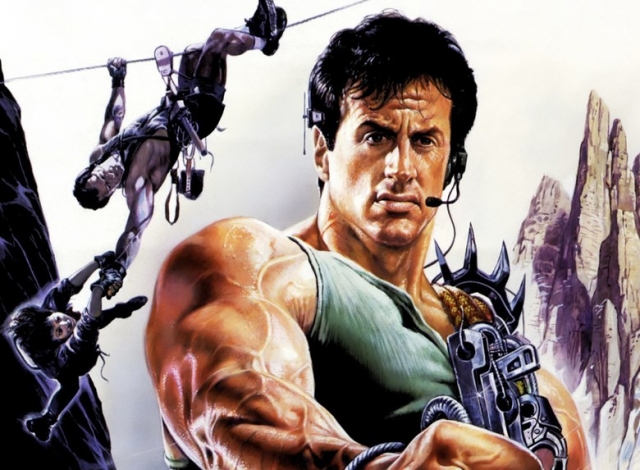EDITORIAL: Our Real-Life Cliffhanger
Those over a certain age know that “Cliffhanger” is a 1993 action/suspense movie starring Sylvester Stallone, and as in all such entertainments, the big question is “will the good guys win?” Well, of course. The entertainment lies in watching how they do it (Gasp! — skinny ropes over terrifying chasms! Skinny ledges and slipping boots! Unrealistically but entertainingly skimpy clothing in a snowy landscape, with macho muscles and bulging bosoms!) and what happens while they do it. Real-life mountaineers snorted at some of the antics used in the movie, but it was all reasonably amusing.
We’re all living a different sort of cliffhanger right now, but many people are not yet really aware of the predicament we’re in, which is part of the suspenseful nature of it and just one of several factors making the ultimate answer to the question “will the good guys win?” much less predictable than it is in a Hollywood production.
Which cliffhanger, you ask? True, there are several. What will happen with the very odd situation in the US White House? Will the forces of intolerance, war-mongering and “survival of the richest” economics win out over compassion, co-operation to achieve peace, and social justice? Will climate change cause wide-spread economic and social disintegration, and if so, how soon? And are all those questions inter-related? Of course they are. Everything is, isn’t it?
What’s the root of all our problems?
Many people, when they perceive something amiss, want to find ways to fix it, whether it’s a leaky faucet, the larger problem of nation’s infrastructure deficit, or the more complex issue of an arguably malfunctioning economic or social system. Experts have written thousands of words intended to help others see problems as they do, with an eye to solutions.
Capitalism? “Piss on the Poor” economics?
Many people have much to say about capitalism. Recently, our columnist Charles Jeanes wrote a column critical of capitalism. There is a far-right-wing organization called “Foundation for Economic Education” funded in part by the Koch brothers, inter alia, which publishes rather simple-minded and easily disproven explanations that (for example) “Capitalism is Good for the Poor.” That position supports the so-called “trickle-down economics,” which I prefer to call “piss on the poor” economics. Its alleged benefits have been disproven by others much brighter and more knowledgeable than I: see https://www.thebalance.com/trickle-down-economics-theory-effect-does-it-work-3305572; and https://www.hks.harvard.edu/news-events/publications/impact-newsletter/archives/autumn-2009/trickle-down-economics-revisited; and https://psmag.com/economics/trickle-down-economics-is-indeed-a-jokeand Thomas Piketty’s book Capital in the Twenty-First Century; Wikipedia summarizes Piketty’s view “that the rate of capital return in developed countries is persistently greater than the rate of economic growth, and that this will cause wealth inequality to increase in the future.” However, I note that Piketty avoids talking about the relationship between the demand for return on capital and the perceived but highly problematic and illusory need for continual economic growth.
The Harvard Business Review published an article in March, 2011, by Canadian businessman Dominic Barton which explained his views of where capitalism has gone wrong and why so many North Americans have lost faith in it. One cannot help but agree with at least of some of what he says, such as this:
“First, business and finance must jettison their short-term orientation and revamp incentives and structures in order to focus their organizations on the long term. Second, executives must infuse their organizations with the perspective that serving the interests of all major stakeholders—employees, suppliers, customers, creditors, communities, the environment—is not at odds with the goal of maximizing corporate value; on the contrary, it’s essential to achieving that goal.”
By including communities and the environment in the list of major “stakeholders” who must be “served” Barton is using or at least approaching systems thinking. He is recognizing that we are all in this together, and that without a healthy environment and healthy communities, the business and finance sectors will ultimately fail.
So, Communism? Hah.
Communism is an idealistic vision of a classless society in which the society as a whole would collectively own all the resources — the “means of production,” and the fruits of production would be shared fairly among all.
Vladimir Lenin put it this way: “We want to achieve a new and better order of society: in this new and better society there must be neither rich nor poor; all will have to work. Not a handful of rich people, but all the working people must enjoy the fruits of their common labour. Machines and other improvements must serve to ease the work of all and not to enable a few to grow rich at the expense of millions and tens of millions of people. This new and better society is called socialist society. The teachings about this society are called ‘socialism’.” (From To the Rural Poor, 1903)
But when humans actually tried to act on that ideal following the Russian Revolution in 1917, and even though the communist Union of Soviet Socialist Republics (USSR) grew to be acknowledged as a world super-power rivaling and feared by the capitalist United States, somehow it failed to fully achieve the vision of a just and egalitarian society and came to grief, after factional disputes, power struggles, executions and other demonstrations of the usual human foibles. No wonder vodka consumption is so high in that part of the world, even well after the dissolution of the USSR in 1991.
A communist regime in China, since about 1950, marked by more power struggles and executions, does not appear to have successfully implemented Lenin’s vision of an egalitarian, just, socialist society either. But then, I have a bias toward some degree of individual liberty.
The Love of Money?
Humanity has recognized the social ills of greed and wealth inequality for centuries. Consider the Bible: in Timothy, we find this well-known passage (this wording is from the New International version): “For we brought nothing into the world, and we can take nothing out of it. But if we have food and clothing, we will be content with that. Those who want to get rich fall into temptation and a trap and into many foolish and harmful desires that plunge people into ruin and destruction. For the love of money is a root of all kinds of evil. Some people, eager for money, have wandered from the faith and pierced themselves with many griefs.” Many people will dismiss this as ancient and irrelevant; I think its truth shines out and is well proven by the state of the world we see around us today. I think that the people plunged “into ruin and destruction” are not necessarily those who successfully grab excessive wealth, but include those others who suffer in consequence of the “desires” of the rich.
Survival Characteristics
Since our predecessors first oozed forth from the primordial slime, or whatever they oozed forth from, certain abilities have favoured survival. Being able to outrun or outwit predators, for example. Being able to find and eat enough. Being able to stash things for later, when we might not otherwise be able to find them. That latter ability we share with many other creatures, such as whiskey jacks and squirrels. Taken to an extreme, it becomes a topic for TV programs about people who hoard all manner of stuff to the point where their homes become unliveable, and television de-cluttering experts have to intervene and help them clear stuff out.
Oh, but if it’s money they’re hoarding — who sees that as a sort of mental illness? And yet, is it so different from hoarding old newspapers, worn-out clothing, collections of figurines, and items of furniture (or whatever) beyond what one needs? Well, at least it doesn’t usually pile up in the house, or however many houses one feels entitled to own, collect dust bunnies and other, more troublesome varmints, and become a fire hazard. But what’s the use of SO much money? Security, you say? Just how much security does a person or a family need?
In Britain, a group called the “High Pay Commission” produced a 70-page report in November 2011. It made many recommendations to minimize abusive levels of inequality in pay. Here is one small paragraph from its introduction:
“The public is rapidly running out of patience with a system that allows those at the top to enrich themselves while everyone else struggles to make ends meet. This has been thrown into stark relief by the economic crisis, but has been building for the past 30 years.”
One could argue that it has been building for the past several millennia or more, maybe nearly back to that primordial slime, given that wealth has historically provided not only a feeling of security but has always played a large part in dominance over others. And some of us do love to be dominant.
And that’s part of our problem, isn’t it? It hardly matters what political system or economic system we use — there will always be the ones who want to be top dog, who want more than anyone else, and who don’t care what they inflict on others to get it. Even, apparently, to the point of making our entire planet unliveable by way of climate change and other forms of pollution. But, you see, they don’t really believe they’re hurting anything.
A Matter of Belief
If people with any authority over us, or whom we like a lot, catch us young enough or even older but vulnerable to persuasion, they can get us to believe just about any silly thing, and later on we’ll tend to ignore, or even resist ferociously, any facts (no matter how obvious) that challenge those beliefs. It’s called belief perseverance. So those who persist in denying the science of climate change (or anything else they don’t want to believe) can be very difficult to convince, especially if they stand to gain from denying proven facts. “The Oatmeal” has a detailed and clear long explanation of why our brains resist facts so we can cling to erroneous beliefs — the “backfire effect” — in comic form, with a certain amount of very bad language. (Given the effects of belief perseverance in today’s world of politics, it deserves some bad language.)
So the human resistance to changing beliefs is another significant factor in our current cliffhanger: see all the people sliding imperceptibly closer to the precipice! Some of them are arguing about whether or not women should be entitled to display their nipples in public. Or wear burqas. “Hey!” yells a scientist whose instruments have detected the slide toward the edge of the cliff, “we’re all sliding toward that precipice! And we could stop if we all drove spikes in, to anchor ourselves!” And the nipple-arguers yell back, “No we’re not! Fake news! Why should we believe you anyway? You’re just trying to keep your job by scaring people and selling spikes, you alarmist, you!”
When do we find out who wins? So exciting!
That’s the big question, isn’t it? What constitutes “winning,” though? And who are the good guys? It’s all part of the suspense, isn’t it?
Will humans exploit natural resources so abusively that we set in motion a domino effect that will result in a massive die-off of species, including our own? Have we already, and irrevocably, set that in motion? Will it be sudden, or a long, protracted process?
Or will enough humans suddenly realize what’s going on, recognize the authors of our misfortune (Pogo: “We have met the enemy, and he is us”) and collectively act with extraordinary speed, dedication and efficacy to save what remains of our civilization and life on this planet?
Though I’d love to know how this cliffhanger turns out, I’m a bit afraid of the answers. But I guess it wouldn’t really be a cliffhanger without that fear factor. Meanwhile, this confession: I don’t really care who goes around with their nipples hanging out.
























